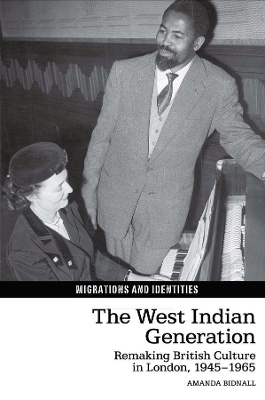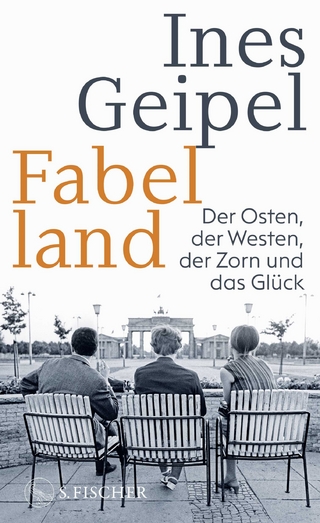
The West Indian Generation
Remaking British Culture in London, 1945–1965
Seiten
2021
Liverpool University Press (Verlag)
978-1-80034-868-4 (ISBN)
Liverpool University Press (Verlag)
978-1-80034-868-4 (ISBN)
- Lieferbar
- Versandkostenfrei
- Auch auf Rechnung
- Artikel merken
The West Indian Generation: Remaking British Culture in London, 1945–1965 shows the progressive potential—and stultifying limits—of cultural collaboration between West Indian artists and entertainers who settled in London and the city’s engines of mainstream culture.
Between Britain’s imperial victory in the Second World War and its introduction of race-based immigration restriction ‘at home,’ London’s relationship with its burgeoning West Indian settler community was a cauldron of apprehension, optimism, ignorance, and curiosity.
The West Indian Generation: Remaking British Culture in London, 1945–1965 revisits this not-quite-postcolonial moment through the careers of a unique generation of West Indian artists that included actors Earl Cameron, Edric Connor, Pearl Connor, Cy Grant, Ronald Moody, Barry and Lloyd Reckord, and calypso greats Lord Beginner and Lord Kitchener. Colonial subjects turned British citizens, they tested the parameters of cultural belonging through their work.
Drawing upon familiar and neglected artifacts from London’s cultural archives, Amanda Bidnall sketches the feathery roots of this community as it was both nurtured and inhibited by metropolitan institutions and producers hoping variously to promote imperial solidarity, educate mainstream audiences, and sensationalize racial conflict. Upon a shared foundation of language, education, and middle-class values, a fascinating collaboration took place between popular West Indian artists and cultural authorities like the Royal Court Theatre, the Rank Organisation, and the BBC. By analyzing the potential—and limits—of this collaboration, Bidnall demonstrates the mainstream influence and perceptive politics of pioneering West Indian artists. Their ambivalent and complicated reception by the British government, media, and populace draws a tangled picture of postwar national belonging. The West Indian Generation is necessary reading for anyone interested in the cultural ramifications of the end of empire, New Commonwealth migration, and the production of Black Britain.
Between Britain’s imperial victory in the Second World War and its introduction of race-based immigration restriction ‘at home,’ London’s relationship with its burgeoning West Indian settler community was a cauldron of apprehension, optimism, ignorance, and curiosity.
The West Indian Generation: Remaking British Culture in London, 1945–1965 revisits this not-quite-postcolonial moment through the careers of a unique generation of West Indian artists that included actors Earl Cameron, Edric Connor, Pearl Connor, Cy Grant, Ronald Moody, Barry and Lloyd Reckord, and calypso greats Lord Beginner and Lord Kitchener. Colonial subjects turned British citizens, they tested the parameters of cultural belonging through their work.
Drawing upon familiar and neglected artifacts from London’s cultural archives, Amanda Bidnall sketches the feathery roots of this community as it was both nurtured and inhibited by metropolitan institutions and producers hoping variously to promote imperial solidarity, educate mainstream audiences, and sensationalize racial conflict. Upon a shared foundation of language, education, and middle-class values, a fascinating collaboration took place between popular West Indian artists and cultural authorities like the Royal Court Theatre, the Rank Organisation, and the BBC. By analyzing the potential—and limits—of this collaboration, Bidnall demonstrates the mainstream influence and perceptive politics of pioneering West Indian artists. Their ambivalent and complicated reception by the British government, media, and populace draws a tangled picture of postwar national belonging. The West Indian Generation is necessary reading for anyone interested in the cultural ramifications of the end of empire, New Commonwealth migration, and the production of Black Britain.
Amanda Bidnall is an independent scholar, writer, and editor.
List of Figures
Acknowledgments
Introduction
Chapter 1 West Indies to London
Chapter 2 West Indian Interventions at the BBC
Chapter 3 London Calypso
Chapter 4 Ronald Moody, from Primitive to Black British
Chapter 5 The Race Relations Narrative in British Film
Chapter 6 Barry Reckord, the Race Relations Narrative, and the Royal Court Theatre
Conclusion
Bibliography
Index
| Erscheinungsdatum | 08.04.2021 |
|---|---|
| Reihe/Serie | Migrations and Identities ; 7 |
| Zusatzinfo | 6 Halftones, black and white |
| Verlagsort | Liverpool |
| Sprache | englisch |
| Maße | 156 x 234 mm |
| Themenwelt | Geschichte ► Allgemeine Geschichte ► Zeitgeschichte |
| ISBN-10 | 1-80034-868-1 / 1800348681 |
| ISBN-13 | 978-1-80034-868-4 / 9781800348684 |
| Zustand | Neuware |
| Haben Sie eine Frage zum Produkt? |
Mehr entdecken
aus dem Bereich
aus dem Bereich
Gewalt, Umwelt, Identität, Methode
Buch | Softcover (2024)
Spector Books OHG (Verlag)
CHF 49,95
der Osten, der Westen, der Zorn und das Glück
Buch | Hardcover (2024)
S. Fischer (Verlag)
CHF 36,40
die Deutschen und ihre Demokratie seit den 1980er-Jahren
Buch | Hardcover (2023)
Siedler (Verlag)
CHF 39,20


